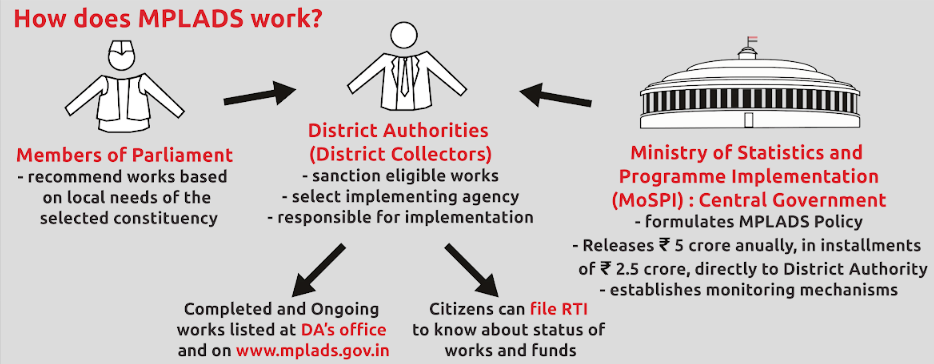Governance
MPLAD Scheme
- 17 Mar 2021
- 4 min read
Why in News
Recently, funds from Members of Parliament Local Area Development Scheme (MPLADS) were disbursed to the village panchayats of Goa.
- Due to Covid-19 pandemic MPLAD Funds Scheme is currently suspended and the disbursed funds were allocated earlier.
Key Points
- About:
- MPLAD is a Central Sector Scheme which was announced in December 1993.
- Initially, it came under the control of the Ministry of Rural Development. Later, in October 1994, it was transferred to the Ministry of Statistics and Programme Implementation.
- Functioning:
- Each year, MPs receive Rs. 5 crore in two instalments of Rs. 2.5 crore each. Funds under MPLADS are non-lapsable.
- Lok Sabha MPs have to recommend the district authorities projects in their Lok Sabha constituencies, while Rajya Sabha MPs have to spend it in the state that has elected them to the House.
- Nominated Members of both the Rajya Sabha and Lok Sabha can recommend works anywhere in the country.
- Priority Projects:
- The projects include assets building such as drinking water facilities, primary education, public health sanitation and roads.
- Since June 2016, the MPLAD funds can also be used for implementation of the schemes such as Swachh Bharat Abhiyan, Accessible India Campaign (Sugamya Bharat Abhiyan), conservation of water through rain water harvesting and Sansad Aadarsh Gram Yojana, etc.
- Criticism:
- Implementation Lapses: The Comptroller and Auditor-General of India (CAG) has flagged instances of financial mismanagement and artificial inflation of amounts spent.
- No Statutory Backing: The scheme is not governed by any statutory law and is subject to the whims and fancies of the government of the day.
- Monitoring and Regulation: The scheme was launched for promoting participatory development but there is no indicator available to measure level of participation.
- Breach of Federalism: MPLADS encroaches upon the domain of local self governing institutions and thereby violates Part IX and IX-A of the Constitution.
- Conflict with Doctrine of Separation of Powers: MPs are getting involved in executive functions.
- Debate over Constitutionality:
- National Commission to Review the Working of the Constitution, 2002: Recommended immediate discontinuation of the MPLAD scheme on the ground that it was inconsistent with the spirit of federalism and distribution of powers between the centre and the state.
- 2nd Administrative Reforms Commission’s report on “Ethics in Governance”, 2005: Opined that it seriously erodes the notion of separation of powers, as the legislator directly becomes the executive.
- Supreme Court Judgement, 2010: A five-judge bench of the Supreme Court ruled that there was no violation of the concept of separation of powers because the role of an MP in this case is recommendatory and the actual work is carried out by the Panchayats and Municipalities which belong to the executive organ.





